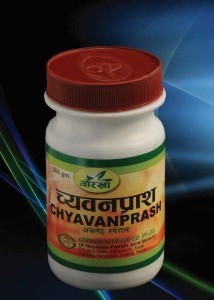Introduction:
Chyavanprash is one of the oldest traditional recipes used in Ayurveda since ancient time as a Rasayana (rejuvenative). It is a proven rejuvenator that slows down aging process. It is useful in general and old age debility, improves growth in young, increases body resistance to diseases and useful in respiratory problems. Chyvanprash mainly contains Amala,, Jaggery, Ghee, Dasamula (ten roots), Honey Prakshep dravyas (Aromatic herbs), Astavarga (Eight vital roots). Chyvanprash is widely used as a nutritional supplement and rejuvenating rasayana in Nepal and India.
Chyawanaprash tastes sweet and sour at the same time. The taste is largely dominated by the flavors of Amala, honey, ghee and cane sugar, Its appearance resembles to semi-molten tar i.e. it is a dark brown thick paste like substance. Clarified butter, cinnamon and other spices used in it contribute to its smell.
Mythology:
In ancient time, sage Chyvan sat on the forest for meditation. He was covered with moss, twigs, leaves and branches from meditating for so long in the same place. Along came a princess, dancing her way through the forest playing a game in which she was blindfolded. By chance, her delicate hand grazed the head of the sage. Likely much to her father’s dismay, she was obliged to ask the sage to marry her, as according to the tradition she was only to touch one man in her lifetime. Surprisingly, Chyawan agreed; but he asked some time to prepare himself. He sought out a combination of herbs that would restore his youthfulness and vitality so that he might offer his young bride conjugal bliss and the joy of years together. As the story goes, he was successful in his endeavor, and the recipe for this herbal rasayana made it into the famous Charaka Samhita some 2,000 years ago, and possibly into the Vedas prior to that. It became known as Chyawanprash, Chyawan’s Rasayana.
Composition
The main ingredient of all Chyawanprash is Amla. Other ingredients are:
- ashwagandha
- asparagus
- amla
- bamboo manna
- blue Egyptian water lily
- cardamom
- chebulic myrobalan
- Chinese cinnamon
- cinnamon bark
- clove
- Indian rose chestnut
- country mallow
- feather foil plant (Phyllanthus niruri or Bhumiamalaki)
- galls
- ghee
- Giant potato (Ipomoea mauritiana or Kiribadu Ala)
- Giloy (Guduchi)
- honey
- Indian kudzu
- Irish root
- liquorice
- Long pepper (Piper longum)
- Malabar nut (Seed of Adhatoda vasica)
- Nut grass
- Potassium sorbate
- Raisins
- Round zedoary
- sandalwood
- sesame oil
- Spreading hogweed (Boerhavia diffusa)
- Sugar
- Tiger’s claw or Ice plant
- Wild black gram
- Wild green gram
- Winter cherry (or Ashwaghanda)
Health Benefits
Chyawanprash increases immunity, improves digestion, helps in bowel movements and increases sexual potency. Amala , the primary ingredient of Chyawanaprash is one of the richest natural source of Vitamin C (445 mg/100g). Chyvanprash is used in general and old age debility, asthma, chronic cough and urinary troubles.
Administration:
Chyawanaprash is usually taken (eaten) directly or along with warm milk or water. The recommended dose is usually about 1 tablespoonful (15 gm) twice a day after meal.
Presentation :
Bottle of 250, 500 and 1000 gm.

